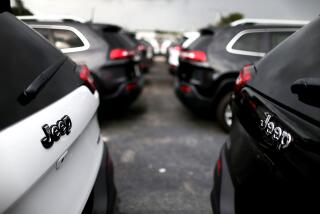Tesla confirms 3rd fire in a Model S hatchback in five weeks
For most of this year, Tesla Motors has looked like the next Google or Apple.
Its stock soared about 470% as Wall Street analysts characterized the business as a small but revolutionary automaker that acted like a tech company — disrupting the status quo with its sporty, high-end electric cars.
It turns out there are some potholes in Tesla’s path.
The automaker confirmed Thursday that a fire burned up one of its $70,000-plus Model S hatchbacks. It was the third such incident in five weeks and triggered calls for a federal safety investigation.
Meanwhile, car shopping website and auto reviewer Edmunds.com said its has encountered mechanical problems in its Tesla that have forced the replacement of numerous parts, including the entire drivetrain.
A battery supply bottleneck, heavy research and development spending and declining sales of lucrative environmental credits also have created head winds for the Palo Alto automaker. Several Wall Street analysts have cut their price targets for the company, and Efriam Levy of Standard & Poor’s has recommended selling the stock.
“Tesla still has to follow the laws of physics, just like any other car company,” said Thilo Koslowski, an analyst at Gartner Inc.
Tesla Motors Inc.’s shares soared from $33.87 on Dec. 31 to its all-time high of $193.37 on Sept. 30. The growth was powered by brisk Model S sales, a glowing review from Consumer Reports, top results in federal crash tests and more than $100 million in sales of regulatory environmental credits to other automakers.
But since then — mostly this week — Tesla stock has plunged 28%, including 7.5% Thursday, to $139.77.
“People realized that the stock was probably at a higher price than it should have been,” Koslowski said. “This is a correction.”
The latest fire was after a crash Wednesday near Smyrna, Tenn. That followed fires in two other Model S hatchbacks, the first in Seattle and the second in Mexico. Both cars were in crashes, and the fires injured no one.
Normally, car fires don’t influence investors. There are about 150,000 annually, according to the National Fire Protection Assn. However, safety officials have been tracking fires in electric cars, as well as airplanes, computers and other equipment, out of concern that lithium-ion battery systems might be prone to fires.
But three fires associated with crashes of new cars — as opposed to battered, older gasoline vehicles produced under less-stringent safety standards — are a matter of concern, said Clarence Ditlow, executive director for the Center for Auto Safety.
“There is no question that the National Highway Traffic Safety Administration should start looking at this,” Ditlow said.
Koslowski said people shouldn’t be alarmed by the fires but said they do raise questions that Tesla and regulators should answer.
“How many Teslas were in an accident and didn’t catch fire?” he asked. “We need to know how frequently the battery ignites following an accident.”
NHTSA reviewed the Tesla fire in Seattle and concluded it was caused by the accident rather than a vehicle defect.
Tesla said it contacted the driver of the car in Tennessee and noted he “believes the car saved his life. Our team is on its way to Tennessee to learn more about what happened in the accident.”
Separate from questions of safety, these repeated incidents are taking a toll on Tesla, said Karl Brauer, an analyst at car information company Kelley Blue Book.
“For a company with a stock price based as much or more on image than financials, those recurring headlines are highly damaging,” he said.
The automaker said Tuesday it lost $38.5 million, or 32 cents a share, in the third quarter. That compares with a loss of $110.8 million, or $1.05 a share, in the same period last year. Now that it is delivering cars, revenue grew to $431 million from just $50.1 million a year earlier.
Meanwhile, Edmunds said its 2013 Model S was “making an ominous noise under acceleration and deceleration. It originates from the rear of the car and seems to be getting worse.”
It is a complaint that’s also starting to show up on Tesla’s owners forum, an online discussion group hosted by the automaker for drivers of its cars.
“Mine had that and it got bad at 70 mph,” said one owner, posting under the “mortgagebruce” moniker.
He said Tesla had to replace the drivetrain twice to fix the problem.
Tesla also replaced the drivetrain on the Edmunds car but declined to say what caused the problem. It also replaced the driver door mechanism because of another problem. The car has been driven 10,000 miles .
“We have encountered a number of problems,” said Dan Edmunds, the website’s director of vehicle testing. “If anything is going to sink them, it will be quality issues, not a fire.”
He said Edmunds has encountered a jammed sunroof and a broken driver door handle. The computer screen had to be replaced, and the rear alignment became so out of whack Tesla had to replace the car’s tires because of wear.
“I still think they have a hell of a product, but this is a brand new company just starting to learn how to build cars,” Edmunds said. “They seemed to really focus on the structure of the car, but the details — the regular car stuff that everyone else has had years to figure out — are causing problems.”
Tesla spokeswoman Liz Jarvis Shean declined to respond to the issues reported by Edmunds.
twitter.com/latimesjerry







